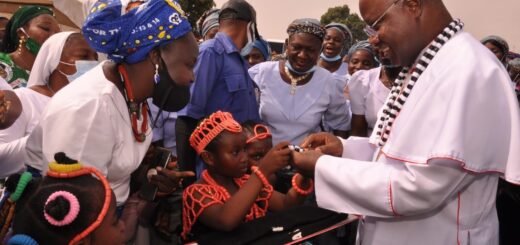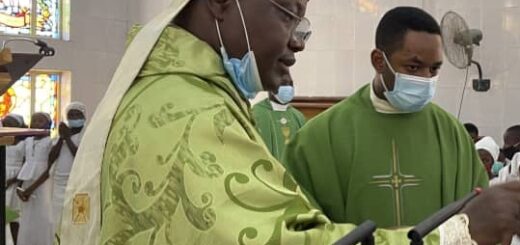The Vineyard
by ARCH BISHOP · October 4, 2020
27th Sunday Homily by Archbishop I. A. Kaigama at St. Martin of Tours Parish Church, Mabushi, Abuja. 4th October, 2020
Readings: Isaiah 5:1-7; Ps. 79(80): 9, 12-16, 19-20; Philippians 4:6-9; Matthew 21:33-43
The word “vineyard” is mentioned in both first reading and the Gospel reading today a number of times. In the first reading, Prophet Isaiah calls the house of Israel a vineyard. In the Gospel, the tenants work in a vineyard. The tenants here would refer to the Jewish leaders (chief priests and scribes), whose opposition to Jesus increased steadily and culminated in His brutal death. The imagery of the vineyard is an invitation to us to bloom and as individuals, Church and nation to bear fruits of love, joy, peace, patience, kindness, gentleness, goodness, faithfulness and self-control as mentioned by St. Paul in Galatians 5:22-23. The Lord said to His followers, “I chose you from the world that you should go and bear fruit; fruit that will last” (Jn. 15:16).
We are therefore warned today against spiritual sterility or neutrality and called to become fruit-producing Christians from the time the seed of sanctity was planted in us at baptism and confirmation. God who planted the seeds is looking for a good harvest. Are we productive?
God’s care and expectations from His Chosen people is captured by Prophet Isaiah in the first reading. In spite of the many blessings lavished upon the Israelites who had possessed the Promised Land, they had become divided into a Northern Kingdom, Israel, whose capital was Samaria, and a Southern Kingdom, Judah, with its capital in Judah. The Prophet lamented at the unfaithfulness and life of ingratitude of the Chosen people. God wondered, “What could I have done for my vineyard that I have not done? I expected it to yield grapes. Why did it yield sour grapes instead?” (Is. 5:4).
The landowner in the Gospel, sent his servants to the vineyard, to obtain the produce from it, but the tenants beat some servants, tortured others and even killed some, including his son.
The senseless killings and the destruction of innocent lives of citizens in different parts of the nation was why the Catholic Bishops’ Conference of Nigeria requested for forty days of prayer. St. Paul in admonishing the Philippians today says, “Have no anxiety at all, but in everything, by prayer and petition, with thanksgiving, make your requests known to God” (4:6). We must make our worries known to God through prayer and supplication as Psalm 55:22 tells us to, “Cast our burdens unto God for he loves and cares for us.”
God tells us in Psalm 50:15: “Call upon me in the day of trouble and I will deliver you.” David testifies in Psalm 34:6, “This poor man called and the Lord heard him, and saved him from all his troubles.”
Three days ago we marked our 60th national independence anniversary. Our land is richly blessed with an abundance of material and human resources and this is no doubt, an expression of God’s benevolence towards us. Even the COVID-19 pandemic that is ravaging the world, has not hurt Nigeria as badly as we had feared; not because we live under a virus resistant climate, or possess a superior biological make up or operate better healthcare facilities, but purely out of God’s grace and mercy to us. In spite of these channels of blessings, we have, in many ways failed God, producing wild fruits and bitter grapes. A litany of woes and anti-social behaviour can easily be compiled.
In fervent supplication and thanksgiving we lift up our nation, Nigeria, to God. Nigeria should be a brilliant star shining in Africa, but some among us like the wicked tenants allow their ingratitude, infidelity and hostility to darken our image and stagnate our progress.
In response to Jesus saying, “By their fruits you shall know them” (Mt. 7:16), let us take a self-assessment test today. Am I a good tenant? Am I a wild grape contributing to violence, bloodshed and oppression? Am I supporting our parish to produce good fruits? Am I a merely Sunday Christian? Have I a missionary spirit? How can I support mission efforts such as the World Mission Sunday and the recently created thirty new Pastoral Areas in our Archdiocese which formally kicks off today? We pray that the priests assigned to these areas and the Christian faithful in these mission areas will prove good stewards and produce good harvest of abundant fruits.
In our National Anthem we sing that we are a people, called “to serve with heart and might, one nation bound in freedom, peace and unity”. Unfortunately, today, many of us only think of what we can get from Nigeria, not willing to sacrifice for the common good, but we prefer personal, regional, tribal, religious and partisan political interests. Let us be conscious of the judgment of God on the unfaithful tenants in the Gospel. Also, the judgment that Isaiah foresaw was brought about in the wars and exiles of the people of Israel by the Assyrians and Babylonians, and the destruction of Jerusalem by the pagans in the year 70 AD.
The Lord reminds us that if we do not repent He will come and remove our lamp stand from its place (cf. Rev. 2:5). We must implore the Lord with these words of the Psalmist, “O Lord God of host, bring us back; let your face shine on us, and we shall be saved” (Ps. 80:19).




